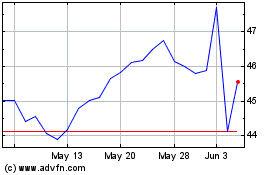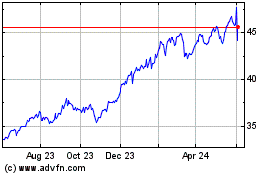Time to Buy the India Infrastructure ETF - ETF News And Commentary
July 31 2012 - 5:45AM
Zacks
As developed markets continue to struggle, many investors have
shifted their focus to emerging nations. Undoubtedly, three of the
most popular destinations have been in the BRIC bloc, specifically
in the case of Brazil, India, and China.
In terms of investment in these three emerging giants, some of
the biggest gains could be had in both the consumer and
infrastructure sectors. That is because these segments are often
considered to be ‘low hanging fruit’ and are usually some of the
first ones that newly industrialized economies see big gains in as
they make the transition to upper-middle income nations.
This is usually the result of more middle class consumers
demanding not only higher quality staple products, but more choices
in terms of discretionary goods as well, at least on the consumer
side. Beyond this, transportation and general infrastructure
systems like power grids and water treatment also must be upgraded
in order to support growing populations that are demanding more and
higher quality services, just like their developed market
peers.
While investors have seen a bump in the road in terms of
consumer spending growth in these markets thanks to rising
inflation and a general market slowdown, infrastructure spending is
continuing to roar ahead both as a necessary expenditure to keep
growth elevated and as a stimulus stopgap (read Five Emerging
Market Infrastructure ETFs for the Coming Boom).
The trend is already in full swing in both China and Brazil as
both of these nations have either recently undergone, or are in the
process of, spending more on various transportation and general
infrastructure systems. Both of the countries have been heavily
focused on transportation initiatives in this regard, as well as
spending due to high profile events like the Olympics (2016 in
Rio), or the World’s Expo in Shanghai in 2010.
Meanwhile, India has been left in the dust, as the country has
been shut out of a number of high profile international events
while the few that the nation has had, like the 2010 Commonwealth
Games, have turned out disastrously for the world’s most populous
democracy. If anything, events have been getting worse in the
country as close to 40% of the nation doesn’t have electricity
while close to 340 million people—basically the U.S. and
Canada—recently suffered through a massive power outage across much
of the Northern part of the country.
If that wasn’t enough, the incredible 340 million person power
outage was recently outdone by an even more massive loss of power
just a few hours later. In this failure, close to 600 million
people, more than the entire population of North America and half
of India’s population, suffered through another crippling
outage.
Clearly, if India wants to remain relevant in an era of
superpower emerging markets, it will have to vastly increase its
spending on infrastructure in order to keep up. The country
currently ranks in the bottom third for overall quality of
infrastructure including the bottom 20% in terms of electricity
supply and telephone lines, underscoring just how desperate the
situation has become in India (see Three Emerging Market ETFs to
Limit BRIC Exposure).
In fact, some in the sector believe that India will have to
raise infrastructure spending to 10% of GDP by 2017 in order to
keep hitting lofty growth targets. At current GDP levels, this
translates into spending of about $185 billion per year,
representing a huge windfall for companies that are focused in on
the space.
For investors who believe that this will be a key growth market
in the country for the foreseeable future, a closer look at a
quality option in the ETF space from Emerging Global Shares, the
INDXX India Infrastructure Index Fund (INXX),
could be an interesting pick. Below, we highlight some of the key
points regarding this targeted fund which could be a great way to
benefit from more Indian infrastructure spending in the near
future.
The fund holds roughly 30 securities in its basket and tracks
the INDXX India Infrastructure Index which is a benchmark of firms
in various infrastructure industries including metal miners, energy
producers, transportation, and utility companies. The product
charges investors 85 basis points a year in fees and trades on
modest volume of roughly 14,000 shares a day, suggesting modest bid
ask spreads (see more in the Zacks ETF Center).
From an industry perspective, construction materials take the
top spot at 16%, and are closely trailed by electric utilities
(15%), and mobile telecom services with a double digit weighting as
well. Interestingly, these are all some of the sectors that are the
worst-rated in the Indian economy, suggesting that they could be
among the biggest beneficiaries from a spending boom.
In terms of individual firms in the product, Tata Motors takes
the top spot, followed by Power Grid Corp of India and then
Ultratech Cement, which combined, represent 19% of the total assets
in the fund. Investors should also note that value stocks account
for roughly 60% of the total, while large caps make up over 80% of
the fund from a cap perspective (read Does Your Portfolio Need An
India ETF?).
Unfortunately, the fund has been a laggard in terms of 52 week
performance, losing 30.6% in the time period and lagging the main
ETFs tracking the India market by several hundred basis points over
the past year. However, the trend has seemingly reversed in recent
months as INXX is now among the best performing large-cap focused
India products, adding 8.6% in YTD terms.
This surge in performance, which has beaten out
WisdomTree India Earnings (AMEX:EPI)
Historical Stock Chart
From Dec 2024 to Jan 2025

WisdomTree India Earnings (AMEX:EPI)
Historical Stock Chart
From Jan 2024 to Jan 2025
